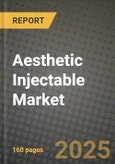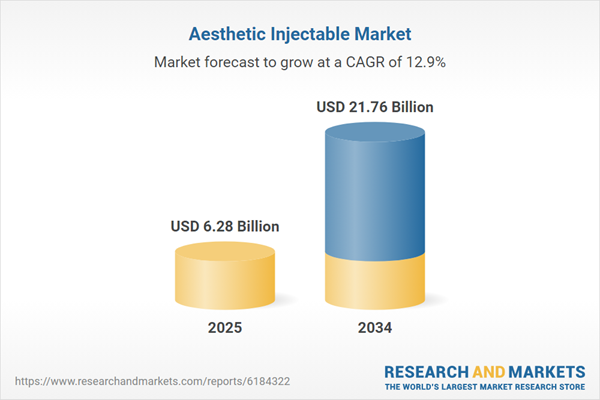Aesthetic Injectable Market
The Aesthetic Injectable market comprises neurotoxins, hyaluronic acid (HA) fillers, biostimulators, and ancillary agents delivered via minimally invasive procedures to address dynamic and static facial lines, volume loss, contouring, and skin quality. Top applications include upper-face line relaxation, mid-face volumization, lip and chin augmentation, jawline contouring, tear-trough correction, and global facial harmonization; off-face use spans hands, neck, and décolletage. The latest trends feature longer-lasting neurotoxins, high-cohesivity and low-swelling HA gels tailored to anatomical planes, collagen-stimulating injectables, combination protocols with energy-based devices, needle-free adjuncts (microcannulas, novel delivery), and AI-enabled assessment tools for consultation and treatment planning. Growth is driven by consumer preference for subtle, downtime-sparing enhancements; social media-amplified aesthetics; physician and non-physician injector base expansion; and improved product safety profiles and reversibility. The competitive landscape includes multinational leaders and specialty innovators competing on rheology portfolios, duration, reversibility, safety, and training ecosystems. Companies differentiate via branded injection techniques, robust KOL networks, real-world registries, and quality-management around cold-chain and counterfeiting prevention. Key considerations include adverse event prevention and management (vascular occlusion, nodules), anatomical education, patient selection, and ethical marketing. Regulatory environments continue to evolve, shaping labeling, injector eligibility, and promotion. Overall, the category is shifting from single-defect correction to holistic, staged facial optimization supported by data-driven protocols and durable, anatomy-specific formulations.Aesthetic Injectable Market Key Insights
- Procedure mix tilts to combination therapy: Outcomes increasingly rely on pairing neurotoxins for dynamic lines with HA fillers or biostimulators for structure and skin quality, sequenced over multiple sessions to minimize downtime and optimize natural results. Treatment “plans,” not single visits, are becoming the norm.
- Formulation engineering defines use-case: HA fillers now span soft, moldable gels for lips/tear troughs to high-G′, high-cohesivity gels for chin and jawline. Tuned rheology and crosslinking enable precise layer placement, projection, and reduced edema, supporting anatomically specific SKUs.
- Next-gen neurotoxins lengthen intervals: Emerging toxins emphasize extended duration and rapid onset, improving patient adherence and clinic scheduling efficiency. Longer dosing intervals align with subscription maintenance models and predictable revenue cycles for practices.
- Biostimulation gains share in midface and skin quality: Calcium hydroxylapatite and poly-L-lactic acid protocols target collagen remodeling and laxity, complementing volumization. Protocols emphasize dilution strategies, cannula delivery, and staged sessions to balance lift with texture improvement.
- Safety and reversibility remain decisive: Readiness for hyaluronidase use, ultrasound-guided injections in high-risk zones, and vascular occlusion algorithms are now standard of care. Practices differentiate on complication preparedness, patient education, and informed consent workflows.
- Digital funnels drive patient acquisition: Social platforms, before-after standards, and virtual consults shorten decision cycles. AI-assisted facial analysis and simulation tools aid expectation management, with privacy and authenticity policies becoming practice differentiators.
- Training ecosystems create competitive moats: Manufacturers invest in tiered injector education, cadaver labs, ultrasound anatomy, and technique-specific cannula courses. Credentialing, mentorship, and community forums strengthen brand loyalty and safe adoption.
- Clinic economics favor diversified menus: Practices hedge seasonality with balanced portfolios across toxins, HA, biostimulators, and skin boosters. Inventory programs, vial sharing policies, and outcome-based bundles support margins while aligning with patient goals.
- Regulation shapes access and messaging: Divergent rules on injector eligibility, advertising, and off-label education influence market penetration. Leaders align with compliant medical education, pharmacovigilance, and serialization to deter counterfeits and gray-market flows.
- Longevity and natural aesthetics set demand curve: Consumers prefer subtle changes over time. Materials science targeting durability, low swelling, and tissue integration - paired with conservative dosing philosophies - wins trust and repeat business.
Aesthetic Injectable Market Reginal Analysis
North America
Market development is driven by a large, informed consumer base, strong private-practice ecosystems, and extensive KOL networks. Clinics emphasize differentiated experiences, safety protocols, ultrasound-guided injections in complex zones, and subscription maintenance plans. Training access is robust, accelerating adoption of novel rheologies and longer-lasting toxins. Compliance requirements for advertising, consent, and pharmacovigilance are stringent, elevating quality systems and documentation. Competitive intensity is high, with practices leveraging digital funnels and data-backed protocols to improve retention.Europe
A mature regulatory framework emphasizes safety, traceability, and professional training standards, encouraging disciplined product use and documentation. Country-specific rules on injector eligibility and promotion create varied access and messaging strategies. Technique innovation is strong, with cadaveric education and ultrasound growing in routine use. Clinics prioritize natural results and conservative dosing, with biostimulators gaining traction for pan-facial collagen support. Tendering and distributor models influence pricing, while counterfeit mitigation and serialization remain priorities.Asia-Pacific
Demand is propelled by large, youth-skewed populations and beauty-forward cultures, alongside rising disposable incomes and urban clinic expansion. Treatment preferences include contouring of jawline and chin, refined lip work, and skin-quality boosters. Training capacity varies; partnerships and center-of-excellence models help standardize safety. Local manufacturing and regional brands expand access, while premium practices adopt ultrasound guidance and advanced rheologies. Digital commerce and influencer ecosystems accelerate awareness but raise expectations for rapid, minimal-downtime outcomes.Middle East & Africa
Growth concentrates in metropolitan hubs and medical tourism corridors, with premium clinics emphasizing privacy, concierge services, and combination protocols. High-photoexposure environments and cultural preferences support maintenance of toxin regimens and HA contouring. Import regulation, distributor networks, and clinician training availability shape brand choice. Practices invest in complication management readiness and authenticity verification to counter gray-market risks. Emerging markets focus on foundational training and phased adoption of advanced techniques.South & Central America
Private clinics and aesthetic chains lead adoption, with academic centers supporting anatomy and safety education. Consumer interest is strong for lip augmentation, mid-face support, and harmonization procedures that suit diverse facial types. Currency volatility and import dynamics influence inventory strategies and treatment pricing. Training access and proctoring drive safe growth, while social media channels fuel demand and require high standards for before-after transparency. Practices differentiate via bundled plans, follow-up protocols, and reliable post-treatment support.Aesthetic Injectable Market Segmentation
By Product
- Hyaluronic Acid (HA)
- Botulinum Toxin (Botox)
- Aquatic Light Injections
- Others
By End-User
- Medical Spas
- Dermatology Clinics
- Hospitals
By Application
- Facial Line Correction
- Lip Augmentation
- Face Lift
- Acne Scar Treatment
- Lipoatrophy Treatment
- Others
Key Market players
Allergan Aesthetics (AbbVie), Galderma, Merz Aesthetics, Ipsen, Revance Therapeutics, Teoxane, Sinclair Pharma, Croma-Pharma GmbH, LG Chem (YVOIRE), Hugel Inc., Medytox Inc., Daewoong Pharmaceutical (Nabota/Jeuveau), Evolus Inc., Prollenium Medical Technologies, Laboratoires VivacyAesthetic Injectable Market Analytics
The report employs rigorous tools, including Porter’s Five Forces, value chain mapping, and scenario-based modelling, to assess supply-demand dynamics. Cross-sector influences from parent, derived, and substitute markets are evaluated to identify risks and opportunities. Trade and pricing analytics provide an up-to-date view of international flows, including leading exporters, importers, and regional price trends.Macroeconomic indicators, policy frameworks such as carbon pricing and energy security strategies, and evolving consumer behaviour are considered in forecasting scenarios. Recent deal flows, partnerships, and technology innovations are incorporated to assess their impact on future market performance.
Aesthetic Injectable Market Competitive Intelligence
The competitive landscape is mapped through proprietary frameworks, profiling leading companies with details on business models, product portfolios, financial performance, and strategic initiatives. Key developments such as mergers & acquisitions, technology collaborations, investment inflows, and regional expansions are analyzed for their competitive impact. The report also identifies emerging players and innovative startups contributing to market disruption.Regional insights highlight the most promising investment destinations, regulatory landscapes, and evolving partnerships across energy and industrial corridors.
Countries Covered
- North America - Aesthetic Injectable market data and outlook to 2034
- United States
- Canada
- Mexico
- Europe - Aesthetic Injectable market data and outlook to 2034
- Germany
- United Kingdom
- France
- Italy
- Spain
- BeNeLux
- Russia
- Sweden
- Asia-Pacific - Aesthetic Injectable market data and outlook to 2034
- China
- Japan
- India
- South Korea
- Australia
- Indonesia
- Malaysia
- Vietnam
- Middle East and Africa - Aesthetic Injectable market data and outlook to 2034
- Saudi Arabia
- South Africa
- Iran
- UAE
- Egypt
- South and Central America - Aesthetic Injectable market data and outlook to 2034
- Brazil
- Argentina
- Chile
- Peru
Research Methodology
This study combines primary inputs from industry experts across the Aesthetic Injectable value chain with secondary data from associations, government publications, trade databases, and company disclosures. Proprietary modeling techniques, including data triangulation, statistical correlation, and scenario planning, are applied to deliver reliable market sizing and forecasting.Key Questions Addressed
- What is the current and forecast market size of the Aesthetic Injectable industry at global, regional, and country levels?
- Which types, applications, and technologies present the highest growth potential?
- How are supply chains adapting to geopolitical and economic shocks?
- What role do policy frameworks, trade flows, and sustainability targets play in shaping demand?
- Who are the leading players, and how are their strategies evolving in the face of global uncertainty?
- Which regional “hotspots” and customer segments will outpace the market, and what go-to-market and partnership models best support entry and expansion?
- Where are the most investable opportunities - across technology roadmaps, sustainability-linked innovation, and M&A - and what is the best segment to invest over the next 3-5 years?
Your Key Takeaways from the Aesthetic Injectable Market Report
- Global Aesthetic Injectable market size and growth projections (CAGR), 2024-2034
- Impact of Russia-Ukraine, Israel-Palestine, and Hamas conflicts on Aesthetic Injectable trade, costs, and supply chains
- Aesthetic Injectable market size, share, and outlook across 5 regions and 27 countries, 2023-2034
- Aesthetic Injectable market size, CAGR, and market share of key products, applications, and end-user verticals, 2023-2034
- Short- and long-term Aesthetic Injectable market trends, drivers, restraints, and opportunities
- Porter’s Five Forces analysis, technological developments, and Aesthetic Injectable supply chain analysis
- Aesthetic Injectable trade analysis, Aesthetic Injectable market price analysis, and Aesthetic Injectable supply/demand dynamics
- Profiles of 5 leading companies - overview, key strategies, financials, and products
- Latest Aesthetic Injectable market news and developments
Additional Support
With the purchase of this report, you will receive:- An updated PDF report and an MS Excel data workbook containing all market tables and figures for easy analysis.
- 7-day post-sale analyst support for clarifications and in-scope supplementary data, ensuring the deliverable aligns precisely with your requirements.
- Complimentary report update to incorporate the latest available data and the impact of recent market developments.
This product will be delivered within 1-3 business days.
Table of Contents
Companies Mentioned
- Allergan Aesthetics (AbbVie)
- Galderma
- Merz Aesthetics
- Ipsen
- Revance Therapeutics
- Teoxane
- Sinclair Pharma
- Croma-Pharma GmbH
- LG Chem (YVOIRE)
- Hugel Inc.
- Medytox Inc.
- Daewoong Pharmaceutical (Nabota/Jeuveau)
- Evolus Inc.
- Prollenium Medical Technologies
- Laboratoires Vivacy
Table Information
| Report Attribute | Details |
|---|---|
| No. of Pages | 160 |
| Published | November 2025 |
| Forecast Period | 2025 - 2034 |
| Estimated Market Value ( USD | $ 6.28 Billion |
| Forecasted Market Value ( USD | $ 21.76 Billion |
| Compound Annual Growth Rate | 12.9% |
| Regions Covered | Global |
| No. of Companies Mentioned | 15 |









